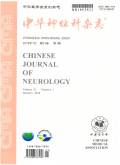摘要:目的 探讨肝豆状核变性(HLD)患者心脏结构和功能的变化.方法 收集2010年3月至2011年2月于安徽中医药大学神经病学研究所附属医院住院的90例未接受正规治疗的HLD患者.依据临床表现将其分为肝型组(31例)、脑型组(42例)、脑-内脏型组(17例);同时依据Child-pugh分级将患者分为Child A级组(71例)、Child B级组(10例)和Child C级组(9例).对90例HLD患者和30名健康对照者进行彩色多普勒超声心动图分析.结果 (1)脑-内脏型、肝型组HLD患者的左心房内径[(28.00±3.11)、(29.62±3.44) mm]及左心室内径[(45.69±3.75)、(47.10±4.73) mm]较对照组[(24.86±2.63)、(41.93±3.56) mm]扩大(t=3.143、4.761,P=0.018、0.000;t=3.764、5.167,P=0.018、0.000),肝型组的左心房和左心室内径较脑型组[(26.06±3.68)、(43.34±3.88) mm]扩大(t=3.557,P=0.000;t =3.751,P=0.001).肝型组患者舒张早期与舒张晚期的二尖瓣血流速度比值(E/A)较对照组明显降低(1.57±0.37、1.93±0.20,t=-0.352,P=0.006).(2) HLD Child B、C级组的左心房内径[(31.29±1.70) 、(34.67±1.97) mm]及左心室内径[(48.29±2.81)、(53.67±2.67) mm]均较对照组[(24.86±2.63)、(41.93±3.56) mm]明显扩大(t=6.429、9.810,P=0.000、0.000;t=6.357、10.738,P=0.000、0.000),同时也均明显大于Child A级组[(26.42±3.05)、(43.89±3.76) mm]患者(=4.871、8.252,P=0.000、0.000;t=4.399、8.780,P =0.003、0.000).Child B、C级组的E/A值(1.58±0.32、1.26±0.39)均较对照组(1.93±0.20)降低(t=-0.347、0.662,P=0.020、0.000),同时Child C级组的E/A值较Child A级组(1.80±0.33)明显降低(t=-0.530,P=0.000).结论 HLD患者可能存在心脏结构和功能的改变,主要表现为左房左室增大、心脏舒张功能不全,而收缩功能尚未发现严重影响.且心脏结构和功能改变与HLD患者肝硬化程度有关.%Objective To investigate the changes of cardiac structure and function in patients with hepatolenticular degeneration (HLD).Methods From March 2010 to February 2011,90 HLD patients who did not receive formal treatment (observation group) and 30 healthy people (control group) were collected and analyzed with color Doppler echocardiography in the Institute of Neurology,Affiliated Hospital of Anhui University of Traditional Chinese Medicine.Based on the clinical manifestations,cases were divided into hepatic type group (n =31),brain type group (n =42) and brain-visceral type group (n =17).According to the Child-Pugh classification,patients were divided into Child A group (n =71),Child B group (n =10) and Child C group (n =9).Results (1) The left atrial diameter ((28.00 ± 3.11),(29.62 ± 3.44) mm) and left ventricular diameter ((45.69 ± 3.75),(47.10-± 4.73) mm) of HLD patients in brain-visceral type group and hepatic type group were larger than that of the control group ((24.86 ± 2.63),(41.93 ±3.56) mm;t =3.143,4.761,P=0.018,0.000;t=3.764,5.167,P=0.018,0.000).The left atrial diameter and left ventricular diameter of hepatic type group were significantly larger than the brain type group (26.06 ± 3.68,43.34 ± 3.88;t =3.557,P =0.000;t =3.751,P =0.001).The value of E/A in the hepatic type group (1.57 ± 0.37) was significantly lower than the control group (1.93 ± 0.20;t =-0.352,P =0.006).(2) The left atrial diameter ((31.29 ± 1.70),(34.67 ± 1.97) mm) and left ventricular diameter ((48.29 ± 2.81),(53.67 ± 2.67) mm) of Child B and C groups were significantly larger than the control group ((24.86 ± 2.63),(41.93 ± 3.56) rm;t =6.429,9.810,P =0.000,0.000;t =6.357,10.738,P =0.000,0.000),and the Child A group ((26.42 ± 3.05),(43.89 ± 3.76) rm;t=4.871,8.252,P=0.000,0.000;t =4.399,8.780,P=0.003,0.000).The value of E/A of Child B and C groups (1.58 ± 0.32,1.26 ± 0.39) was lower than that of the control group (t =-0.347,0.662,P=0.020,0.000);At the same time,the value of E/A of Child C group was significantly lower than that of Child A group (1.80 ± 0.33;t =-0.530,P =0.000).Conclusions The HLD patients may have cardiac structural and functional changes,mainly manifested as left atrial and left ventricular enlargement and cardiac diastolic dysfunction,whereas a serious impact has not yet been found in systolic function.And the changes of cardiac structure and function were related to the degree of liver cirrhosis in patients with HLD.

